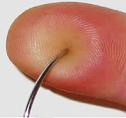
Needlestick Injuries Top Nurses' Concerns
The American Nurses Association (ANA) (www.nursingworld.org) yesterday announced the findings of the 2008 Study of Nurses' Views on Workplace Safety and Needlestick Injuries, an independent nationwide survey of more than 700 nurses, developed and co-sponsored by ANA and Inviro Medical Devices. According to the latest research, nearly two-thirds (64 percent) of U.S. nurses said needlestick injuries and bloodborne infections remain major concerns, and 55 percent believe their workplace safety climate negatively affects their own personal safety.
"An overwhelming majority of nurses (87 percent) said safety concerns influence their decisions about the type of nursing they do and their continued practice in the field," said ANA President Rebecca M. Patton, MSN, RN, CNOR. "This study exemplifies the serious concerns expressed by nurses across the country. Concerns that may prompt nurses to leave the bedside, exacerbating the growing nurse shortage. To enhance the safety climate of all healthcare workers, improvements need to be made to the workplace environment and staffing levels."
According to the study, the vast majority of nurses (89 percent) said increasing workloads and workplace stress levels (84 percent) impact workplace safety. When asked how their employer ranks key issues, 35 percent of nurses perceive patient care and organizational reputation as first, followed by patient safety, infection control, health care worker safety, and staff productivity.
Illustrating scenarios that could potentially increase errors in the workplace, the majority of nurses surveyed (59 percent) said that when pressure mounts, they feel the need to work faster, even if it means taking shortcuts.
Sixty-four percent of nurses report being accidentally stuck by a needle while working. This mirrors findings from the 2006 Study of Needlestick Injuries and Safety Devices. Despite the requirements of the 2000 Needlestick Act mandating the use of safety syringes, 75 percent of the needlestick injuries reported involved a standard (non-safety) syringe.
Among those nurses reporting needlestick injuries, a 74 percent have been stuck by a contaminated needle while working. This figure is virtually identical to the 2006 study in which 73 percent claimed to have experienced a contaminated needlestick. In 2008, more than one-third (35 percent) reported two or more contaminated needlesticks over the course of their career.
When asked how nurses attained their most recent needlestick injuries, the top three responses include: while giving an injection (28 percent); before activating the safety feature (19 percent); and during the disposal of a non-safety device (19 percent).
While the overwhelming majority of nurses (91 percent) are familiar with their workplace's protocol regarding needlestick injuries, 79 percent of those accidentally stuck by a needle while working said they reported the incident, compared to 83 percent in 2006.
Nearly half (46 percent) of those who have been stuck said, during their most recent needlestick injury, they received an evaluation or were treated within one to two hours; yet more than one- third (39 percent) state they were not evaluated or treated at all. Nine percent said they were treated within four hours; two percent within the first eight hours; three percent the next day; and one percent more than 24 hours afterwards.
Conducted in April, the study is sponsored by the American Nurses Association, with support provided by Inviro Medical Devices. Research results can be downloaded at: www.nursingworld.org.